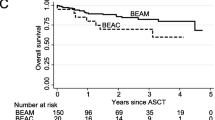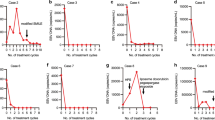Abstract
Pembrolizumab (anti-programmed cell death-ligand 1 inhibitor) is a promising salvage therapeutic option for relapsed/refractory extranodal NK/T-cell lymphoma (R/R ENKTL). However, the appropriate duration of pembrolizumab use in R/R ENKTL patients and the optimal timing for administering pembrolizumab remain undetermined. We collected and analyzed clinical information on R/R ENKTL 58 patients who received pembrolizumab to evaluate the optimal treatment durations and clinical information for considering treatment interruption. Treatment outcomes were assessed by 18F-fluorodeoxyglucose positron emission tomography/computed tomography (FDG PET/CT) and Epstein Barr virus DNA (EBV DNA) every 3 months. Nineteen (32.8%) patients had been treated with more than three chemotherapies before pembrolizumab administration. The best response rate towards the first try of pembrolizumab was 38.9% (31.5% complete response rate (CR), 7.4% partial response (PR)). During the 41.8-month median follow-up duration, the median progression-free survival (PFS) was 3.1 months, and the median overall survival (OS) was 7.1 months. The failure group, which was characterized by Deaville score (DS) 3–4 and circulating EBV detection, or DS 5 with/without EBV detection, had the worst PFS (p < 0.001) and OS (p < 0.001), followed by the high (DS 1–2 and EBV detection, or DS 3–4 and EBV not detected) and low-risk groups (DS 1–2 and EBV not detected). Among the 21 patients who achieved the best response at the first pembolizumab try, the patients who received planned 24 cycles presented better PFS than those who received incomplete cycles (57.6 months vs 20.9 months, P-value = 0.012). Among 13 patients who received avelumab or pembrolizumab in advance, a few who responded to the second trial of pembrolizumab administration had over one year of chemotherapy vacation. Determining the discontinuation or continuation of pembrolizumab would be considered in selected cases assessed by PET-CT and EBV monitoring. Disruption of pembrolizumab treatment may be advisable for the low-risk group(DS 1–2 and EBV not detected), whereas continuation could be warranted for the high-risk group (DS 1–2 and EBV detection, or DS 3–4 and EBV not detected). Moreover, it might be critical to maintain over 24 cycles to improve the survival outcome of R/R ENKTL.




Similar content being viewed by others
Data availability
No datasets were generated or analysed during the current study.
References
Kommalapati A, Tella SH, Ganti AK, Armitage JO (2018) Natural killer/t-cell neoplasms: analysis of incidence, patient characteristics, and survival outcomes in the United States. Clin Lymphoma Myeloma Leuk 18:475–479. https://doi.org/10.1016/j.clml.2018.04.009
Tse E, Kwong YL (2017) The diagnosis and management of NK/T-cell lymphomas. J Hematol Oncol 10:85. https://doi.org/10.1186/s13045-017-0452-9
Wang L, Li LR, Zhang L, Wang JW (2020) The landscape of new drugs in extranodal NK/T-cell lymphoma. Cancer Treat Rev 89:102065. https://doi.org/10.1016/j.ctrv.2020.102065
Fox CP et al (2020) Survival outcomes of patients with extranodal natural-killer T-cell lymphoma: a prospective cohort study from the international T-cell Project. Lancet Haematol 7:e284–e294. https://doi.org/10.1016/S2352-3026(19)30283-2
Kim SJ et al (2013) Extranodal natural killer/T-cell lymphoma involving the gastrointestinal tract: analysis of clinical features and outcomes from the Asia Lymphoma Study Group. J Hematol Oncol 6:86. https://doi.org/10.1186/1756-8722-6-86
Lim SH et al (2017) Beyond first-line non-anthracycline-based chemotherapy for extranodal NK/T-cell lymphoma: clinical outcome and current perspectives on salvage therapy for patients after first relapse and progression of disease. Ann Oncol 28:2199–2205. https://doi.org/10.1093/annonc/mdx316
Youk HJ, Hwang SH, Oh HB, Ko DH (2022) Evaluation and management of platelet transfusion refractoriness. Blood Res 57:6–10. https://doi.org/10.5045/br.2022.2021229
Nairismägi M et al (2018) Oncogenic activation of JAK3-STAT signaling confers clinical sensitivity to PRN371, a novel selective and potent JAK3 inhibitor, in natural killer/T-cell lymphoma. Leukemia 32:1147–1156. https://doi.org/10.1038/s41375-017-0004-x
Song TL et al (2018) Oncogenic activation of the STAT3 pathway drives PD-L1 expression in natural killer/T-cell lymphoma. Blood 132:1146–1158. https://doi.org/10.1182/blood-2018-01-829424
Li X et al (2018) Activity of pembrolizumab in relapsed/refractory NK/T-cell lymphoma. J Hematol Oncol 11:15. https://doi.org/10.1186/s13045-018-0559-7
Tse E et al (2022) Extranodal natural killer/T-cell lymphoma: An overview on pathology and clinical management. Semin Hematol 59:198–209. https://doi.org/10.1053/j.seminhematol.2022.10.002
Kwong YL et al (2017) PD1 blockade with pembrolizumab is highly effective in relapsed or refractory NK/T-cell lymphoma failing l-asparaginase. Blood 129:2437–2442. https://doi.org/10.1182/blood-2016-12-756841
Chan TSY et al (2018) PD1 blockade with low-dose nivolumab in NK/T cell lymphoma failing L-asparaginase: efficacy and safety. Ann Hematol 97:193–196. https://doi.org/10.1007/s00277-017-3127-2
Kim SJ et al (2020) Avelumab for the treatment of relapsed or refractory extranodal NK/T-cell lymphoma: an open-label phase 2 study. Blood 136:2754–2763. https://doi.org/10.1182/blood.2020007247
Danson S et al (2019) Are we over-treating with checkpoint inhibitors? Br J Cancer 121:629–630. https://doi.org/10.1038/s41416-019-0570-y
Kim SJ et al (2015) Risk stratification on the basis of Deauville score on PET-CT and the presence of Epstein-Barr virus DNA after completion of primary treatment for extranodal natural killer/T-cell lymphoma, nasal type: a multicentre, retrospective analysis. Lancet Haematol 2:e66-74. https://doi.org/10.1016/S2352-3026(15)00002-2
Kim SJ et al (2016) A prognostic index for natural killer cell lymphoma after non-anthracycline-based treatment: a multicentre, retrospective analysis. Lancet Oncol 17:389–400. https://doi.org/10.1016/S1470-2045(15)00533-1
Cho J et al (2020) Immune subtyping of extranodal NK/T-cell lymphoma: a new biomarker and an immune shift during disease progression. Mod Pathol 33:603–615. https://doi.org/10.1038/s41379-019-0392-8
Cheson BD et al (1999) Report of an international workshop to standardize response criteria for non-Hodgkin’s lymphomas. NCI Sponsored International Working Group. J Clin Oncol 17:1244. https://doi.org/10.1200/jco.1999.17.4.1244
Cheson BD et al (2007) Revised response criteria for malignant lymphoma. J Clin Oncol 25:579–586. https://doi.org/10.1200/JCO.2006.09.2403
Kim SJ et al (2015) Risk stratification on the basis of Deauville score on PET-CT and the presence of Epstein-Barr virus DNA after completion of primary treatment for extranodal natural killer/T-cell lymphoma, nasal type: a multicentre, retrospective analysis. The Lancet Haematology 2:e66–e74
Wang L, Wang JW (2020) PD-1 blockade in extranodal NK/T-cell lymphoma: who is in charge? Leukemia 34:3432–3433. https://doi.org/10.1038/s41375-020-01046-8
Jeong SH (2020) Extranodal NK/T cell lymphoma. BR 55:S63–S71. https://doi.org/10.5045/br.2020.S011
Huang HQ et al (2019) Preliminary results from a multicenter, single-arm, Phase 2 Study of CS1001, an anti-programmed death-ligand 1 (PD-L1) human monoclonal antibody (mAb), in patients (pts) with relapsed or refractory extranodal natural killer/t cell lymphoma (rr-ENKTL). Blood 134:2833–2833. https://doi.org/10.1182/blood-2019-121865
Li JY et al (2020) Sintilimab for relapsed/refractory (r/r) extranodal NK/T cell lymphoma (ENKTL): Extended follow-up on the multicenter, single-arm phase II trail (ORIENT-4). J Clin Oncol 38:abstract 8050. https://doi.org/10.1200/JCO.2020.38.15_suppl.8050
Havel JJ, Chowell D, Chan TA (2019) The evolving landscape of biomarkers for checkpoint inhibitor immunotherapy. Nat Rev Cancer 19:133–150. https://doi.org/10.1038/s41568-019-0116-x
Yi M, Niu M, Xu L, Luo S, Wu K (2021) Regulation of PD-L1 expression in the tumor microenvironment. Journal of Hematology & Oncology 14:10. https://doi.org/10.1186/s13045-020-01027-5
McGranahan N et al (2016) Clonal neoantigens elicit T cell immunoreactivity and sensitivity to immune checkpoint blockade. Science 351:1463–1469. https://doi.org/10.1126/science.aaf1490
Dang TO, Ogunniyi A, Barbee MS, Drilon A (2016) Pembrolizumab for the treatment of PD-L1 positive advanced or metastatic non-small cell lung cancer. Expert Rev Anticancer Ther 16:13–20. https://doi.org/10.1586/14737140.2016.1123626
LaFleur MW, Muroyama Y, Drake CG, Sharpe AH (2018) Inhibitors of the PD-1 Pathway in Tumor Therapy. J Immunol 200:375–383. https://doi.org/10.4049/jimmunol.1701044
Boyerinas B et al (2015) Antibody-Dependent Cellular Cytotoxicity Activity of a Novel Anti-PD-L1 Antibody Avelumab (MSB0010718C) on Human Tumor Cells. Cancer Immunol Res 3:1148–1157. https://doi.org/10.1158/2326-6066.Cir-15-0059
Kwong YL, Pang AW, Leung AY, Chim CS, Tse E (2014) Quantification of circulating Epstein-Barr virus DNA in NK/T-cell lymphoma treated with the SMILE protocol: diagnostic and prognostic significance. Leukemia 28:865–870. https://doi.org/10.1038/leu.2013.212
Wang L et al (2015) Post-treatment plasma EBV-DNA positivity predicts early relapse and poor prognosis for patients with extranodal NK/T cell lymphoma in the era of asparaginase. Oncotarget 6:30317–30326. https://doi.org/10.18632/oncotarget.4505
Lauer EM, Mutter J, Scherer F (2022) Circulating tumor DNA in B-cell lymphoma: technical advances, clinical applications, and perspectives for translational research. Leukemia 36:2151–2164. https://doi.org/10.1038/s41375-022-01618-w
Ha JY et al (2020) Superiority of Epstein-Barr Virus DNA in the Plasma Over Whole Blood for Prognostication of Extranodal NK/T Cell Lymphoma. Front Oncol 10:594692. https://doi.org/10.3389/fonc.2020.594692
Delivanis DA et al (2017) Pembrolizumab-Induced Thyroiditis: Comprehensive Clinical Review and Insights Into Underlying Involved Mechanisms. J Clin Endocrinol Metab 102:2770–2780. https://doi.org/10.1210/jc.2017-00448
Acknowledgements
This research was supported by a grant from the Korea Health Technology R&D Project through the Korea Health Industry Development Institute, funded by the Ministry of Health & Welfare, Republic of Korea (HR20C0025), a National Research Foundation of Korea grant funded by the Korean government (2022R1F1A1064058), and the Bio&Medical Technology Development Program of the National Research Foundation (NRF) funded by the Korean government (MSIT) (No. RS-2023-00222838).
Funding
No commercial funding was received to support this study.
Author information
Authors and Affiliations
Contributions
W.S.K. and S.E.Y. conceived and designed the study. S.E.Y., H.C., P.B., J.C., H.Y.K., D.H.Y., N.S., S.J.K., and W.S.K. gathered patients for the study and collected clinical data. S.E.Y. analyzed the data and wrote the manuscript. All authors edited the manuscript and approved the final version.
Corresponding author
Ethics declarations
Competing interests
The authors declare no competing interests.
Additional information
Publisher's Note
Springer Nature remains neutral with regard to jurisdictional claims in published maps and institutional affiliations.
Rights and permissions
Springer Nature or its licensor (e.g. a society or other partner) holds exclusive rights to this article under a publishing agreement with the author(s) or other rightsholder(s); author self-archiving of the accepted manuscript version of this article is solely governed by the terms of such publishing agreement and applicable law.
About this article
Cite this article
Yoon, S.E., Cho, H., Berning, P. et al. Optimization of immune checkpoint inhibitor treatment planning for relapsed or refractory extranodal NK/T cell lymphoma. Ann Hematol (2024). https://doi.org/10.1007/s00277-024-05739-3
Received:
Accepted:
Published:
DOI: https://doi.org/10.1007/s00277-024-05739-3




